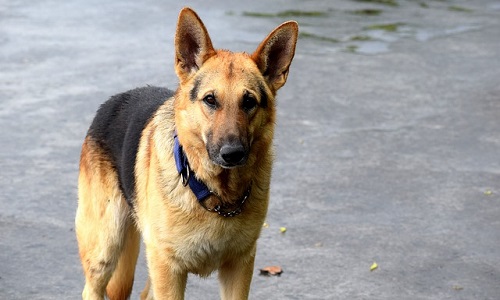Chances are you have experienced food poisoning at some point in your life. If you have, it’s an unpleasant reminder to never eat spoiled food, to always properly cook your meat, and to not eat foods past their expiration dates. In other cases, food poisoning can be caused by food allergies.
No matter the reason, food poisoning is never an enjoyable experience. The same goes for if it ever happens to your dog. And while the experience can be fairly similar to what we feel as humans when we encounter food poisoning, dogs have certain foods that are toxic to them that are generally perfectly safe for humans.
In this post, we’re going to dig into food poisoning in dogs to give you a helpful guide to follow so you know what foods to watch out for, what causes food poisoning, and what you can do to help your dog if you suspect he has food poisoning.
First, let’s quickly answer the question at hand.
Can Dogs Get Food Poisoning?
Yes! They can. And it is actually much more common than you’d think.
The reason for that is because an upset stomach or illness will also be attributed to something else when food poisoning is actually to blame. The symptoms of food poisoning mirror many illnesses and the food is often not the first thing dog owners and veterinarians think of when trying to diagnose the problem.
In fact, dogs are actually much more prone to food poisoning than humans. This is partly because people often like to feed human foods to their dogs, or even foods meant for other animals. However, these human foods can be poisonous to dogs, especially if the animal has never been exposed to the food before.
But whereas food poisoning for humans means spending some time hovering over the toilet, your dog will more likely hide away and whimper in pain. Your dog may experience vomiting and diarrhea as well, along with a myriad of other possible symptoms. Regardless of the how or the why, you need to get your dog immediate medical attention if you suspect food poisoning.
What Causes Food Poisoning in Dogs?
Just like with humans, bad foods can cause food poisoning in dogs, However, what makes a food “bad” for a dog is different than for a human.
Salmonella can cause food poisoning in dogs just like it would in humans. Salmonella is a bacteria found in raw or undercooked meats, specifically chicken, beef, raw fish, and even eggs.
Other bacterial causes, such as Staphylococcus, can be found in milk and other products that use dairy, such as potato and chicken salads or cream-filled bakery items, and even sausages and gravy. A piecrust can actually act as an insulator for the bacteria and incubate its growth in the filling in dessert items, even if it has been properly refrigerated.
Here are some other foods that are poisonous to dogs.
Avocado
Didn’t expect to see that one starting the list did you? Unfortunately, avocados can be toxic to dogs if they consume too much. Avocados have persin, which can cause canine vomiting and diarrhea. The seed can also be dangerous if ingested and cause blockages in the intestines or stomach.
Alcohol
 Alcohol affects a dog’s liver and brain just like it does in people, but it takes far less to make your dog sick. Just a small amount of alcohol can cause your dog to get sick, with symptoms mirroring those that humans experience, only much more intense. The smaller the dog, and the more alcohol that is consumed, the worse those symptoms will be.
Alcohol affects a dog’s liver and brain just like it does in people, but it takes far less to make your dog sick. Just a small amount of alcohol can cause your dog to get sick, with symptoms mirroring those that humans experience, only much more intense. The smaller the dog, and the more alcohol that is consumed, the worse those symptoms will be.
Coffee, Tea, & Other Items Containing Caffeine
Caffeine is actually much more of an issue than alcohol. Coffee and tea, including the beans, can be fatal if consumed by dogs. Make sure to keep your pup away from anything in your home that has caffeine in it, and seek your veterinarian as soon as possible if you suspect your dog has ingested anything containing caffeine.
Onions & Garlic
No matter whether they are powdered, raw, dehydrated, or cooked, onions can kill a dog’s red blood cells and cause anemia. There is even onion powder in some baby food, so you need to be careful if you feed your baby around your dog. Small doses are okay, but eating larger amounts of onion can cause poisoning in dogs.
Grapes and Raisins
Grapes and raisins are toxic to dogs and can cause canine kidney failure. It only takes a small amount of either to make your dog sick, and they will typically vomit repeatedly if they have consumed any grapes.
Xylitol
This is likely another one you haven’t heard before. Xylitol is a sweetener that is commonly found in things like baked goods, diet foods, toothpaste, and gum. If a dog consumes gum or something else with xylitol, it can cause their blood sugar to drop and even cause liver failure in dogs within just a few days.
Milk & Other Dairy Products
Milk and other dairy products can cause canine diarrhea and other digestive issues for your dog. Dairy products also tend to trigger food allergies in dogs, which will make your pup itchy on top of dealing with diarrhea and digestive issues.
Macadamia Nuts
Anything that has macadamia nuts in it is a major no-no for dogs, as it only takes six macadamia nuts to make a dog sick. If the nuts are consumed along with chocolate, the symptoms of ingesting macadamia nuts can be quite severe for the animal.
Chocolate
Likely the one you’ve been waiting for, it is fairly common knowledge that chocolate is toxic to dogs. Dark chocolate and unsweetened baking chocolate pose the most serious issues, but all types, including white chocolate, are toxic. Chocolate can cause vomiting and diarrhea and tremors, canine seizures, heart problems, and death in more severe cases.
Signs & Symptoms of Food Poisoning in Dogs
Determining if your dog has food poisoning can be a tricky endeavor, as the symptoms often closely mirror those of other illnesses. However, there are many common symptoms associated with food poisoning that you can look out for.
These symptoms include:
- Increased drooling
- Vomiting
- Diarrhea or loose stools
- Cramping
- Dizziness
- Abdominal pain
- Fever
- Lethargy
- Decreased appetite
- Uncontrollable shivering
- Whimpering in pain
- Aggression
These signs and symptoms can be rather subtle, but also may appear rapidly and be quite dramatic. It all depends on what the dog ate and how much of the food it ingested. Most dogs will recover completely from food poisoning if they are given proper care.
Diagnosis of Food Poisoning in Dogs
The diagnosis of food poisoning in dogs is quite similar to the process that is used for humans. It will typically involve making notice of any combination of the above symptoms and calling your veterinarian. If you witnessed your dog eat something that is known to be toxic to canines, report this to your veterinarian, as well as how much you think your dog consumed.
 If you weren’t able to witness your dog eating anything poisonous, a full medical history may be helpful in reaching a proper diagnosis, as well as making note of what foods were around recently that may be the source of the issue. Even a change in diet can cause some illness in dogs, so make note of anything out of the ordinary before the dog became ill.
If you weren’t able to witness your dog eating anything poisonous, a full medical history may be helpful in reaching a proper diagnosis, as well as making note of what foods were around recently that may be the source of the issue. Even a change in diet can cause some illness in dogs, so make note of anything out of the ordinary before the dog became ill.
Treating Food Poisoning in Dogs
The dog’s body will typically react to the presence of toxins by trying to flush them out, either via diarrhea or vomiting, or both. This natural purging of the poison should get rid of the vast majority of the toxins. However, this process will likely cause your dog to become dehydrated very quickly.
Give your dog plenty of water over the first 24 hours after food poisoning. You should not attempt to feed your dog during this time, stick with water only. Chances are good that your dog can recover easily on his own once the food poisoning is purged from their system, but if they repeatedly vomit or don’t show signs of recovery after 24 hours, you should bring your dog in to see your veterinarian. After 24 hours, you can resume feeding your dog a bland diet to ease their upset stomach back into eating solid food.
Every situation will be different, however, so it’s important to carefully take note of what your dog ate and how much. Sometimes the food poisoning can cause acute symptoms that your dog can purge within a few hours. In the better scenario, this means the stomach has fully emptied and the toxin has been eliminated.
However, if the vomiting continues, this could mean the toxin has entered the small intestine, which can be a more serious issue and a sign of internal damage, especially if there is any blood present in the dog’s vomit or diarrhea.
Since each case of food poisoning will be different, it is also difficult to outline how long the illness or recovery period will be. Generally, the vomiting should not last more than several hours, because at that point the dog’s stomach should be fully emptied. But other times it can go on for a longer duration.
If the vomiting continues, it may also point to another health condition other than food poisoning, such as canine pancreatitis, foreign body obstruction, or bloat in dogs, which are all life-threatening issues that require veterinary attention. Consult your veterinarian to rule out these other possible scenarios.
Preventing Food Poisoning in Dogs
You as the dog owner are entirely responsible for keeping your dog’s home safe from food poisoning. Make sure to regularly clear your refrigerator of old and expired foods, and make sure to either keep your garbage hidden in an area your dog cannot access it, or buy a trash container that your dog cannot tip over and/or open.
You also should not ever leave any food items out on the counter if you leave your dog home, unattended during the day, as they are likely to give into temptation. Dogs that are given people food are more likely to try and get into the garbage or eat things left out, so it is likely a best practice to not feed them people food at all. You also should not leave your dog unattended around food during any parties as there will typically be plenty of problem foods for them at these gatherings.
Summary
Food poisoning is an experience most dog owners will have to deal with at some point during their dog’s life. Knowing what your dog ate, how much, and how to handle the situation can go a long way to keeping your dog safe and ensuring an easy recovery. It is best to keep problem foods away from your dog and to make sure all food items in your home are safe for consumption.
Sources:
- Fitzgerald, Kevin. “Can Dogs Get Food Poisoning? – American Kennel Club.” American Kennel Club, 12 Oct. 2016, Accessed 4 Nov. 2018. www.akc.org/expert-advice/health/can-dogs-get-food-poisoning/.
- “Can Dogs Get Food Poisoning?” WagWalking, 7 Dec. 2017, Accessed 4 Nov. 2018. www.wagwalking.com/wellness/can-dogs-get-food-poisoning#.
- “Food Poisoning in Pets 101: What You Need to Know.” PetCoach, Accessed 4 Nov. 2018. www.petcoach.co/article/food-poisoning-in-pets-101/.
- “Toxic and Dangerous Foods Your Dog Should Never Eat.” WebMD, Accessed 4 Nov. 2018. www.pets.webmd.com/dogs/ss/slideshow-foods-your-dog-should-never-eat.




